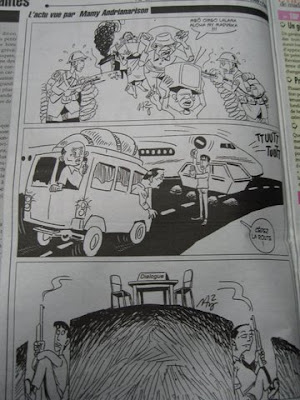
Madagascar falls from 94th to 134th place on Reporters Without Borders’ ranking of freedom of press and medias in 2009. It is tempting to blame this development on the coup d’etat, and the Rajoelina’s regime, but the truth is more nuanced. In fact, for more than half of the period Marc Ravalomanana was still in power.
Arriving in Madagascar, I was in fact a bit surprised by the media situation. In Toliara we had two TV-channels. One was the national TV-channel TVM, where the news basically were dedicated to whatever the president was doing or saying that day. The other channel, MBS, was owned by the president himself…
When the political crisis escalated, the news on both channels was totally useless, since they didn’t report on anything that was happening. (Our only source of information was Radio France International (RFI), when it wasn’t on strike). Then both channels were attacked and looted, so Toliara remained without TV for about 2 months. Now, we are back watching the national TV (the only channel here), and it is actually slightly better than under Ravalomanana. We’re not seeing only the president, but also what the government is doing, sometimes it is even possible to understand that there is an opposition.
Judging from the TV the members of government are very nice and popular, as they are always being welcomed by nice people smiling and waving. These people are of course rewarded with nice gifts on behalf of the regime, always thoroughly made account for by the reporters.
When it comes to newspapers, there are some choices, and they provide less partisan information than the TV. The problem is that they all come from Tana which means that at the earliest they are available in Toliara the afternoon one day after they came out. That’s in the fourth city of Madagascar, with flight connection with the capital on a daily bases. Access to newspapers on the countryside is utopia.
This is without mentioning the problem of actual access, since very few people can afford to have a TV, to buy newspapers or to access the internet. The lack of access to information is an evident problem that we experience every day with our students. It feels very awkward to be asked for information on current affairs by the Malagasy, while we would like to understand more with their help.
But maybe there is hope. Yesterday the minister of communication went out on TV and declared that after many years under the rule of Ratsiraka and Ravalomanana people are finally free to express their opinion in Madagascar. However, she said, there are certain rules to follow…
As a lawyer, I would like to remind her that she also has certain rules to follow when it comes to making rules.


All photos by Lucien David
No comments:
Post a Comment